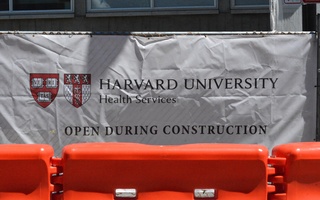As the academic year draws to a close, the number of mumps cases on Harvard’s campus continues to rise, with 58 confirmed cases as of Wednesday.
Students experiencing the mumps may not be able to participate in end-of-year Commencement activities, and those with symptoms of the disease have been encouraged by the Harvard Summer School Study Abroad Office to refrain from traveling.
Harvard University Health Services Director Paul J. Barreira, who provided the updated number, has previously expressed concern over the spread of the disease and asked students to take precautionary measures. He said students infected with the virus would not be able to participate in end-of-year activities.
{shortcode-7d2cd05bfc96bab16e32765977481553b5a62dcb}
“[G]iven the two- to three-week incubation period for the mumps virus, students who come down with the virus at this point may have to miss certain end-of-year and/or summer activities if they are ill,” Barreira wrote in an email statement.
An email sent out last week from the Summer School Study Abroad Office informed students of the mumps outbreak on campus, and encouraged students to refrain from travelling if they experienced any mumps symptoms.
In the email, students were advised to call Harvard Travel Assist if they experienced any symptoms of mumps while abroad, and were told that case managers “will advise you on your situation and work with us to connect you with appropriate resources.”
According to Stephanie T. Kacoyanis, a spokesperson for the Harvard Division of Continuing Education, the Summer School has met with Harvard University Health Services and Global Support Services to discuss issues surrounding the potential spread of the virus abroad.
Though students traveling abroad have to undergo a “health clearance” process, which includes necessary inoculations required for the country of destination, no additional screening for mumps is in place, Kacoyanis wrote in an email. She added that the Summer School Study Abroad Office would not change any policies due to mumps.
“As of now, no changes to any programs are planned, but we will continue to monitor the situation,” Kacoyanis wrote.
Mumps is transmitted through salivary exchange, or respiratory droplets, fairly large particles that come out of people’s mouths and noses.
Those infected with mumps have been placed under quarantine for five days—Harvard College students experiencing symptoms have been housed at the Harvard Inn. The outbreak, which Barreira first confirmed in early March, has affected various groups on campus and spread throughout the Boston area.
—Staff writer Menaka V. Narayanan can be reached at menaka.narayanan@thecrimson.com. Follow her on Twitter @mnarayanan97.Read more in College News
80 Percent of Class of 2020 Admits Plan to MatriculateRecommended Articles
-
A Real Halloween MonsterEbola Hemorrhagic Fever. One of the most terrifying infectious diseases known to man has once again mysteriously surfaced, this time
-
Months After First Outbreak, Campus Rid of MumpsA high rate of vaccination and summer vacation have eliminated any active cases of the virus on campus.
-
Mumps Outbreak Grows to 5, Cases Suspected at YaleHarvard University Health Services confirmed there were five active mumps cases on campus as of Tuesday, up from four when the most recent outbreak was announced.
-
 One Year After Initial Outbreak, Confirmed Mumps Cases Gone From Harvard
One Year After Initial Outbreak, Confirmed Mumps Cases Gone From Harvard -
 Mumps Returns to Harvard with Two Confirmed Cases
Mumps Returns to Harvard with Two Confirmed Cases













